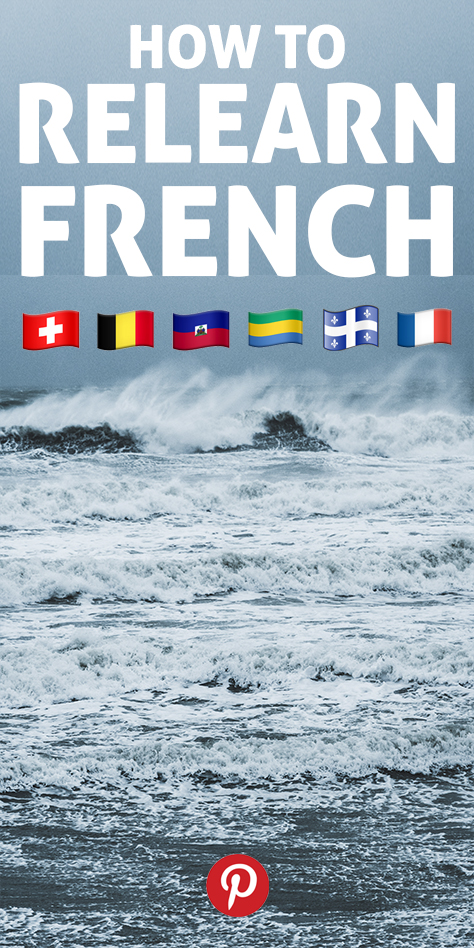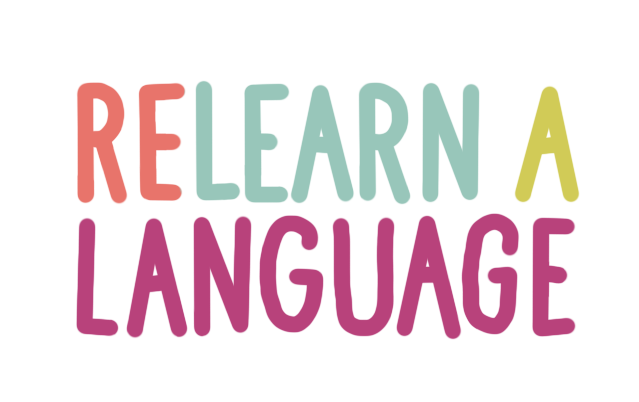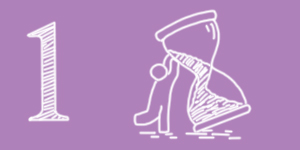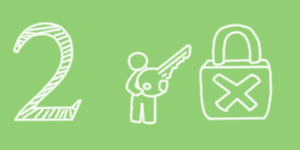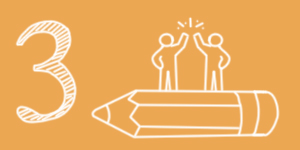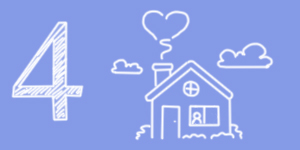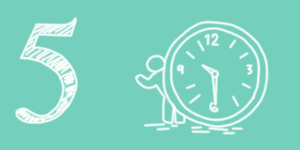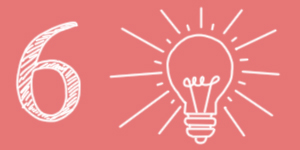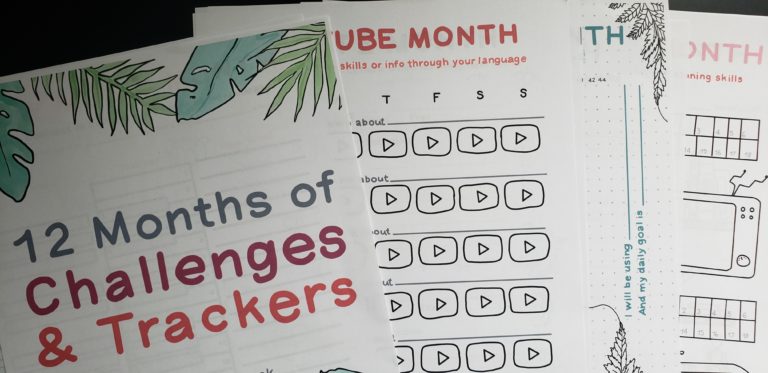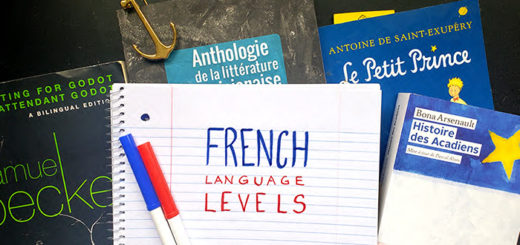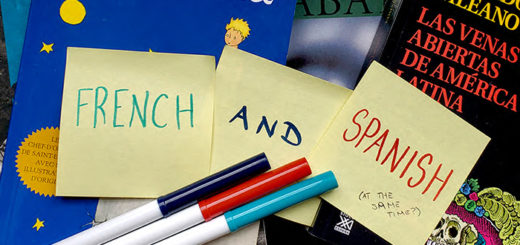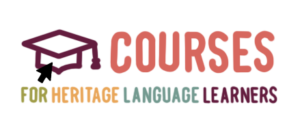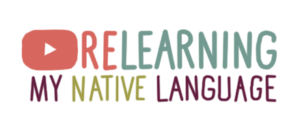How to Relearn French (In-Depth Tutorial for 2021)
by Marissa Blaszko · June 7, 2021

If you want to know how to relearn French, you’re probably:
- unsure where to start relearning French;
- frustration, shame, or guilt about not already knowing French;
- fear of speaking French (and making mistakes);
- and worst of all: frustration with bad apps or textbooks.
I know because I myself have relearned two languages as an adult–including my own native language.
So in this article, we not going to talk about learning French from zero.
We’re going to directly talk about how to relearn French.
This article is designed as an interactive tutorial. If you work through it, by the end you will:
- know why it’s so common that people forget French but want to relearn it;
- understand the science of relearning a language;
- recognize your own personal blocks from relearning French;
- have your own customized plan for relearning French;
- have a plan for maintaining your French so you never have to relearn it again.
Here’s all you need to do:
✏️ When you see this pencil, it’s an invitation to reflect.
You can do this either by journaling or pausing to consider if what was just said reflects your own situation.
✅ When you see this checkmark, it’s an invitation to take action.
Take notes or write down what steps you want to take when you’re done reading this article.
So grab a pen and paper, and start planning!
This article is specifically about how to relearn French. If you want to learn about relearning any language, click here.
FYI, some (but not all) of the product links on this page are affiliate, meaning I might make a small commission on any purchases you make at no additional cost to you. I only recommend products that I myself use, and only affiliate with products I truly believe in.
Table of Contents
Step 1. Revisit Your Past French Experiences
Every month, thousands of people search “how to relearn French” online.
But why are so many people forgetting their French in the first place?
If you look at linguistics, there’s nothing so strange about French grammar that would make people prone to forgetting it. Sure it has plenty of rules and particularities–but so do most languages.
With French, the reason so many people learn then forget the language has everything to do with it’s history.
In the Americas, its linguistic reach once spanned from the Arctic to the Equator and was recognized as a powerful business language in the busy port of Nouvelle Orleans, the wealthy plantations of Haiti, and in major cities in both North America and South America.

At the peak of the French empire, the language was the global business and political language that any educated person could speak. (And why it’s still taught in schools today.)
This is also why there are millions of people in the Americas who’s grandparents (or even parents) grew up speaking French–it’s a language as “native” to the US as English, and why countries like Canada and Haiti still use it as an official language.
But with that long history, why is it disappearing in huge parts of North America?
Well, even under the height of the empire the daily life of a Francophone American was filled with linguistic persecution.
While France struggled to maintain it’s dominance in other parts of the world, they left former citizens at the hands of other governments.
The forced migration of the Acadiens from Canada to the Gulf of Mexico and the bloody imperial wars waged in Haiti for profit meant many French families historically abandoned their own language in search of easier lives en anglais.
Even into the 1970’s, English-only laws in Louisiana, once one of the richest French colonies, outlawed the language.
Today in modern Canada, a legally bilingual country, it can be difficult to find French language services or schools in rural Anglophone areas.
This unique blend of historic circumstances means that there have always been huge populations of French speakers and French students.

But it’s also why the language has slipped away from so many people.
Now, to figure out why 400 years of language policies matter to you and your French, let’s define what kind of re-learner you are.
Why your past French experience matters
So why not just jump into the tips of this tutorial?
Why did we have to go through that history lesson?
Because relearning French has little in common with learning French from zero.
Here are the advantages you have as a re-learner:
- You already have a base. Even if you can’t remember anything from your previous French experiences, new theories of human memory suggest nothing we learn or experience is ever truly lost. Relearning is much, must easier than lea ning from zero.
- You’re motivated. Having strong personal connections to a language is incredibly important in language learning.
- You were born ready. If you were exposed to French before the age of 6 months old, you will have a natural ear for the language. It doesn’t matter if you can’t understand it at all as an adult–you still have an awesome advantage.
From an English-dominant country? Here are your disadvantages:
- Textbooks and apps don’t cater to your needs. Most language education strategies assume no prior knowledge of the language. Repeating the very very easy stuff before you get to the fun stuff might be boring or frustrating.
- You might feel like you’re in a “no-win” situation. If you get good at French right away, some teachers (or family members) might credit your past experience, not your current hard work. And if you don’t get good right away? It’s because of personal failing. Either way, your own hard work may receive the least credit out of any factor.
So let’s determine what kind of French re-learner you are.
✏️ REFLECT: What are some of the advantages you might have in your French journey over someone who has never had any contact with French before?
Type 1: French heritage speakers
The most common definition of a heritage language speaker is someone who had some contact with a language as a child–maybe even as a native speaker.
But now, for whatever reason… they can’t speak it.
Instead, they speak the dominant language where they live.
So let’s look at two case studies of what a heritage language French speaker can look like.
Michelle is a proud French Canadian: her family can be traced back to the original settlers of Quebec.
But to find better jobs, her great grandparents moved their family to Western Canada after the First World War. Both her grandparents grew up as fluent speakers, and even passed it down to their children and grandkids despite being surrounded by English schools and work. But after the death of her grandparents, it’s just been easier to speak English: so now as an adult, Michelle can’t speak it at all.
When Jean’s family moved from France to New York, his mom wanted to keep speaking French at home.
But he started going to English schools in the US. He felt totally bilingual with summers spent visiting family in Europe, but as those trips grew farther apart his French became weaker. He speaks it with his grandparents and family abroad, but is afraid to put it on a resume because “it’s not really that good”.
Do either of these sound like you? You’d be surprised at how common stories like these are.
A 2015 linguistics study of the US Census found that there are likely around 1.2 million heritage language French speakers in the US–that is, people who speak French at home or with their families, but have not been formally educated in the language.
In Canada, the numbers are a little harder to figure out.
According to the 2006 census, there are just under 1 million French users outside of Quebec (that is, where schools and work are normally in English) but it’s unclear as to how many of those French speakers have been able to go to school in their own language.
So if you are a French heritage language speaker or student, you are not alone.
Type 2. Former French language students
So far, we’ve focused on how global politics and the decisions of our ancestors have created massive populations of people who might want to relearn French.
But what about today? Aren’t there French classes available in public schools around the globe?
Is it possible that you’re just bad at languages, and that’s why you forgot your French?
Well, let’s take a look at Canadian bilingualism before we decide whether or not you yourself are simply just bad at French.
Because Canada is a legally bilingual country where all schools must provide at least some instruction in both English and French.
So how many students actually succeed in learning both of their country’s official languages?
Well, only about 17% of Canadians are bilingual in English and French.
And that’s only because 40% of the French-speaking Quebecois also speak English.
Outside of Quebec, the French-English bilingualism rate drops to 7.5%: more than half of which are Francophones living in other regions of the country.
This means that despite years of French education in every public school, non-Francophone Canadians are still not learning the language.
So are language just hard to learn?
Not at all.
Multilingualism is actually the international norm.
Many people look at wealthy countries like Switzerland and Malta as shining examples of multilingual richness, but the fact is that especially in colonized countries like Papa New Guinea or Ghana a person who speaks 3, 4, or even 5+ languages is far more normal than a monolingual.
The fact of that matter is that language learning in public schools in the US, Canada, and Australia is often ineffective because of teacher shortages, budget cuts, or a lack of usage of the language outside of the classroom.
So if you forgot your French despite years of study, I have good news:
It’s not you.
It was your school system.
✏️ REFLECT: Which of these categories of French learner do you fall into? Or are you a mix? What are some negative beliefs you might have about yourself or your ability to relearn French because of your past experiences? (We’ll examine these more in-depth soon.)
Step 2. Recognize Your Personal Blocks to Relearn French
Now that we’ve gone into the bigger picture about why so many people forget their French, we’re going to start applying it to you and your personal journey to relearn French.
Keep an eye out for your invitations to reflect and plan, because this is where you are going to start building your own personal plan for how to relearn French.
How school systems fail language students
When you think of language learning, do you think of sitting in classrooms and working with textbooks?
You’ve likely studied French like this before.
But classroom education in many Western countries might be doing language learners more harm than good.
Rates of anxiety are surging in children and teens around the world. There are whole websites dedicated to its research and treatment with the CDC now reporting that over 7% of children or teens have diagnosed anxiety.
And that isn’t even the huge number of undiagnosed cases.
There are many, many reasons school systems (especially in language classrooms) cause students clinical stress that can severely hard their ability to learn or even develop their brains.
So how could all of these anxiety-filled classrooms have blocked you from fully learning French in school?
- Test anxiety. Test anxiety is a type of performance anxiety. It has nothing to do with actual performance on the test: just knowing that at a certain time or place you. must perform well or face the consequences.
- Social anxieties. Making errors while speaking can cause you to look stupid. But being too good at French? Well, that can cause you to look like a suck-up. Stress in social situations is surprisingly common but makes sense when you think about how complicated many educational situations can be.
- Bad experiences. This can be anything from having a learning style that is different than the style being taught by a French teacher, having work that’s too hard or too easy, or even simply getting bad grades. These problems can multiply over time, and lead to negative thoughts about your ability to relearn French as an adult.
- Lack of sleep. With an increase of homework, expected after-school-activities, and a pining need for a social life… well, most of us didn’t get enough sleep. And the effects can be devastating. Most importantly, a lack of sleep can blow all of these other anxieties through the roof by decreasing your ability to regulate yourself when coming into contact with a stressor.
- The structure of modern schools. The core idea of grading is that if you make errors on tests or on essays, you will be penalized. In real life, it doesn’t work that way. We applaud artists who take daring leaps and sometimes fail. In business, businesses who launch new products have no guarantee of success–but they produce many jewels of the modern world. In schools, staying conservative and repeating what you are told is a safe way to win. But in real life (especially in language learning), it’s guaranteed failure.
These are just some of the huge list of real challenges students are up against while trying to learn–least of all a language.
✏️ REFLECT: Do any of these situations seem familiar to you?
Do you think any of them could have been the reason why your French didn’t fully develop if you studied it once before?
If that is the case, do you think you are personally to blame for being “bad at languages”, or can you forgive yourself for not having learned more?
Anxiety, your brain, and how to relearn French
But how can bad classroom experiences in the past affect our ability to relearn French now as adults?
When we were in schools, our brains were still forming as we learned how to move through the world.
And one of the things brains are especially good at is forming “gut” reactions to certain stimuli.
🐶 Think back to any distinct childhood memory of a dog. Any memory is fine–just the strongest one you have.
If your memory was of a beloved childhood pet, you’re probably the kind of adult who wants to pet any dog they see walking down the street.
If your memory was of being bitten, or maybe a particularly unfriendly dog in your neighborhood, you might feel some sort of anxiety when you see someone walking their large dog towards you on the street.
And if you have particular memories of dogs growing up? Well, you probably don’t feel much of anything when you see a dog walking down the street.
That’s because the emotional experiences we have as children and teens shape three important parts of our brain.
Now let’s pretend 2 different adults with 2 different experiences with dogs see the same big German Shepard walking down the road.
The German Shepard begins to pull on the leash and try to jump towards the owners.
The person with great memories of dogs growing up might interpret this behavior as the dog trying to get their attention (and affection).
The person with bad memories of dogs growing up might interpret this behavior as the dog trying to bite or attack them.
Even if the dog’s owner says “he’s not trying to jump at you, he just likes to pull on the leash”, both adults may still believe that their interpretation of this reality is true–that because of their past experiences with dogs, they know what the dog is really trying to do.
So what does this have to do with how to relearn French?
Because if you have had bad experiences with French before (no matter how minute), you might have gut-instincts that block you from relearning the language.
The reason human brains are so good at forming these gut-reactions is because 4,000 years ago, our ability to run from danger was a matter of survival.
If we replace that dog with a saber tooth tiger, you can see why it would be so important for an adult to have a gut reaction of “run away!” when they saw it pulling on the leash.
But the problem is that our modern world has evolved faster than our brains.
Only 400 years ago (less in some cases) wild animals or small wars posed a massive threat. And our brains haven’t evolved since then.
So if you had a boring French teacher or a few bad test results as a kid?
Your brain learned “French = hard!” using the same nervous system that our ancestors used to learn “wolf = bad!”.
With enough bad language learning experiences (even tiny ones like guilt or shame), your brain will go into fight-or-flight at the sight of a language textbook at the same speed that it would if you suddenly saw a giant bull charging your way.
Evolution simply hasn’t caught up with our world.
So recognizing our past bad experiences and making peace with them is the first thing we need to do when relearning a language.
✏️ REFLECT: Close your eyes and imagine yourself in a French classroom.
Now imagine you make some errors while speaking French in that classroom.
What are some feelings or physical sensations you experience? Where might those feelings be coming from?
Don't let past experiences with French haunt you
The first thing you need to learn in French has nothing to do with grammar or vocabulary.
You need to un-learn some language learning myths.
So let’s go through the most popular misconceptions about what it means to learn (or relearn) a language as an adult.
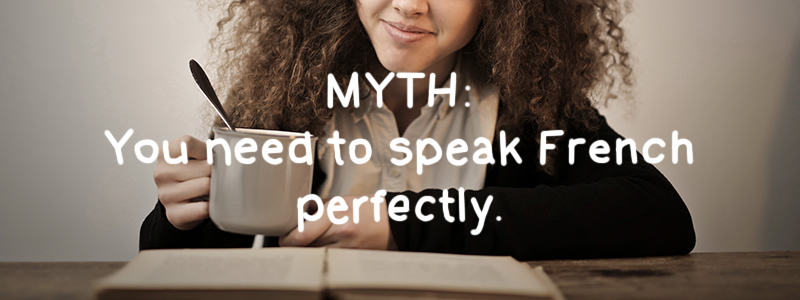
FACT: Mistakes happen in our own native languages all the time–and you’re not being graded.
In English, has a stranger ever handed you a graded paper after a conversation?
No?
That’s because that doesn’t happen. When you stutter, forget a word, use filler words, or need to rephrase what you’re saying… most of the time, no one even notices.
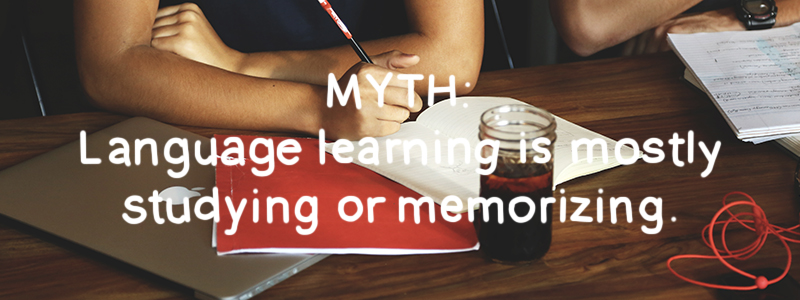
FACT: Relearning French can be fun.
In the 2020s, real language learning isn’t about textbooks or classrooms–or even apps.
You can learn the words of fruits and vegetables while cooking; learn about grammar through podcasts; and practice speaking through online language exchanges. French can be a fun, integrated part of your life and daily routine. (We’ll get to how soon.)
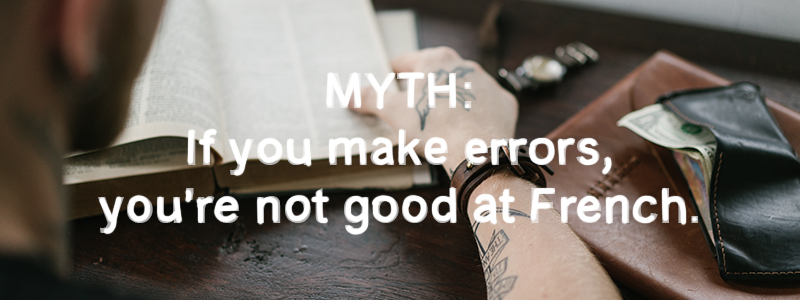
FACT: Many small failures are signs that we are taking risks and trying new things.
If you put off speaking French until you never make errors, you’ll never speak. If you hide your errors from a teacher or tutor, you’ll never know on what part of the language you need to focus your studies.
Again: we make errors all the time in our native languages.
French will be no different.
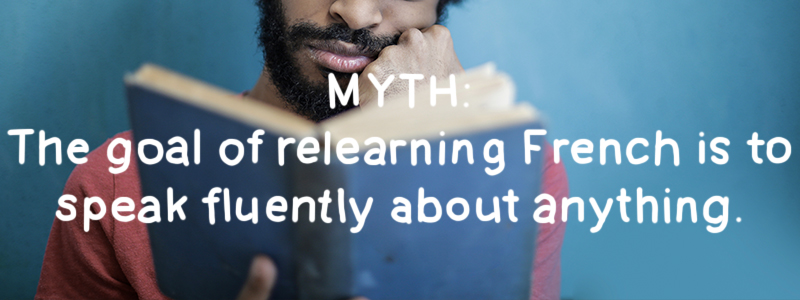
FACT: Everyone will have their own version of success.
So start daydreaming. Not only has daydreaming about future goals been proven to be a powerful tool in combatting stress and anxiety, but it can help you chart your own course for how to relearn French.
If your goal is reconnecting with family, you might want to focus more on everyday language. If your goal is to get a better job, you might want to focus more on technical language than the name of every type of bread.
You can even make language vision boards on Pinterest, but the point is that everyone will have their own vision for why they want to learn French.
✏️ REFLECT: What of these myths do you believe?
Can you think of any other counter-points to disprove them?
Want to feel less alone in your language learning journey?
Join me on YouTube as “Relearn a Language” or Instagram as @MultilingualMarissa
Step 3. Build your plan to relearn French
Grab a pen and paper if you already haven’t–we’re going to start putting together your custom relearning plan.
3A. Find your true reasons for relearning French
There are so, so many amazing reasons why someone would want to know how to relearn French.
But there are also bad reasons to learn French.
If you don’t have an amazing reason and vision to relearn French, when learning it gets hard (and it will) falling off the wagon becomes easy.
So let’s look at two examples of amazing reasons.
Jack’s dream is reconnecting with French-speaking family–especially the older generations, but also cousins his age who still speak French.
When he daydreams about how relearning French would change his life, he thinks about visiting elderly grandparents and hearing their stories, but also about vacationing with cousins and talking like he would with any other friends in his life. But in French!
Marie’s French vision involves her reading a book in a Parisian cafe before heading out to drinks with new coworkers.
She sees herself reading Foucault or Colette over an espresso, and then chatting about art and film with a group of French friends after.
Now: why are these daydreams important?
How do we use them to plan our French studies?
When Jack analyzes his vision, he can identify one umbrella goal (reconnecting with family).
Under that, there are then smaller and more tangible goals: being able to reconnect with his heritage through listening to stories and connecting on a personal level to cousins through conversations.
Maria’s daydream lends itself to different goals.
She has the umbrella goal of moving to Paris, and to do that she’ll have the subgoals of a high reading level (to enjoy literature with) as well as a high conversational ability (to talk about complex ideas with).
The importance Jack and Marie having these goals is:
- They can make sure their study plans align with what they want from French
- They have smaller goals they can reach on the way to their big daydream goals
- Whenever they get frustrated, they’ll still see that they’re on the right path
These goals aren’t about getting good grades or being “perfectly fluent”.
They’re about what a French student individual wants.
So what might a bad goal be for these two characters?
Well if Jack’s main goal is having conversations with his family, he might not care about reading or writing that much. So focusing on perfect spelling or reading classic French novels might frustrate him instead of motivating him.
If Marie’s goal is to moving to Paris and living a life out of a French film, she probably won’t need the perfect accent. Even if she *did* have a perfect accent, friends and coworkers will naturally find out she’s from abroad through conversation. So obsessing over how she sounds might more frustrate than motivate
Remember: the right French goal for you is the one that feels best to you. Not what anyone else thinks.
✅ PLAN: Write down your own daydream for what speaking French will bring into your life.
This isn’t the time to be scientific or even realistic: let your imagination loose!
3B. Decide if traditional French learning techniques will learn for you
Once you have your daydream goal solidified, we’re going to start in the first (and broadest) ways to possibly relearn French.
Because while classrooms might be the go-to first steps for serious French students, they’re not the only way.
Here is a quick quiz to decide if a French-language classroom is right for you.
Rate each question with 1 (disagree) 2 (neutral / NA) or 3 (agree).
✏️ REFLECT: Do this quiz on a scrap of paper.
- I enjoyed sitting in French class when I was younger.
- It’s impossible for me to work unless someone is holding me accountable.
- It’s important for me to connect with other people who share my interests while learning.
- I have the money to afford classes right now.
- Tests or quizzes are motivating for me.
- I like physically going to a place on a set schedule.
- I find planning my own projects overwhelming.
Now let’s look at your points.
- 7-12. You will likely not benefit from a classroom setting. But don’t worry: you still have amazing options like online teachers or at-your-own-pace online courses.
- 13-15. You may or may not benefit from a classroom setting. It might be a thing to experiment with, but it can be expensive, so keep reading and we’ll suggest some alternatives.
- 16-21. You almost certainly will benefit from a classroom in a university or other program, but will still want supplementary help since those classes aren’t specifically for relearning French.
Based on what you scored on this quiz, let’s go onto the next step and help you figure out where to start.
✅ PLAN: Are you going to explore classroom options?
Or options for independent learning?
3C. Find a good language learning guide
Relearning French is going to be a journey–and whether you’re in a classroom or learning solo, you’re in the driver’s seat.
So you need to make sure you have a road map for where to go.
In language learning, we call this a guiding resource.
A guiding resource must have:
- a mix of grammar and vocabulary;
- explanations that teach you those two things;
- and some ways for you two practice those two things.
Amazing guiding resources have:
- both drills and exercises where you write full sentences;
- audio listening practice;
- large paragraphs of text to practice reading;
- some speaking component.
- Classes in local community colleges. Adult classes in community centers aren’t always as nicely structured or have as-experienced teachers. (Although this is assuming you want to be in classes at all.)
- A textbook aimed at your correct level. I personally recommend the Assimil false beginner series for students who want to relearn a language.
- An independent online teacher who has a plan. You can use websites like iTalki, Preply, or Verbling to find teachers who will help you create your own learning path. My personal advice is to steer away from cheap “community tutors” and find a qualified teacher with at least a thousand completed lessons. (Get $10 off your first class here.)
I also suggest trying 2 different guiding resources to start and seeing which one you like most.
If you want to see how I planned my own program to relearn my native language, click here to see a video on my YouTube channel.
✅ PLAN: What guiding resource looks most appealing to you? What steps do you need to take to find a good one?
3D. Start speaking French (before you're ready)
No matter what guiding resource you use, you will have very few occasions to practice speaking French unless you make them yourself.
This is a problem.
In education, we used to believe that skills would transfer: so for example, that being a really good reader would transfer into a high speaking level.
But unfortunately, we know that’s a myth.
The paradoxical nature of language learning is that unless you start speaking before you're ready, you're never going to be ready to speak.
Here are my own biggest tips for practice speaking French.
- Be okay with not being okay. Accept that it will be hard, you’ll make mistakes, and that it’ll be uncomfortable. You’re not getting graded.
- Find an online tutor who has experience with low-level students. They’ll be used to everyone’s mistakes, and not only be patient but judgment-free. (iTalki is a great site for finding someone like this.)
- Tell your speaking partner what you’ve studied recently. They can then come up with speaking topics around what you’re studying.
- Start with shorter sessions of 30min, but be prepared to work your way up to longer 45min or 60min sessions.
- Trust the process. With time, you’ll become more ok with your mistakes and make less of them.
- Eventually, consider language exchanges. Apps like HelloTalk or Tandem are great places to meet other language learners to practice with.
✏️ REFLECT: If you get nervous about speaking French to someone for the first time, what actions will you take to make yourself feel calmer? What are the myths you’re most likely to tell yourself?
✅ PLAN: At what point will you try to have your first conversation with a tutor or language exchange partner? How will you hold yourself accountable and not procrastinate because you’re “not ready”?
Step 4. Relearn French in At-Home Immersion
Now that guiding resource is the map for your French adventure.
But you also need to enjoy the journey.
Check out the scenery, stop at some tourist attractions, have a good meal… you’ll be learning for a while!
The importance is that your supplementary fun not only helps you learn during your passive downtime but integrates French into your life.
(Just don’t forget to keep your “map” in hand and make sure you’re going the right way.)
My personal lists of free French immersion materials!
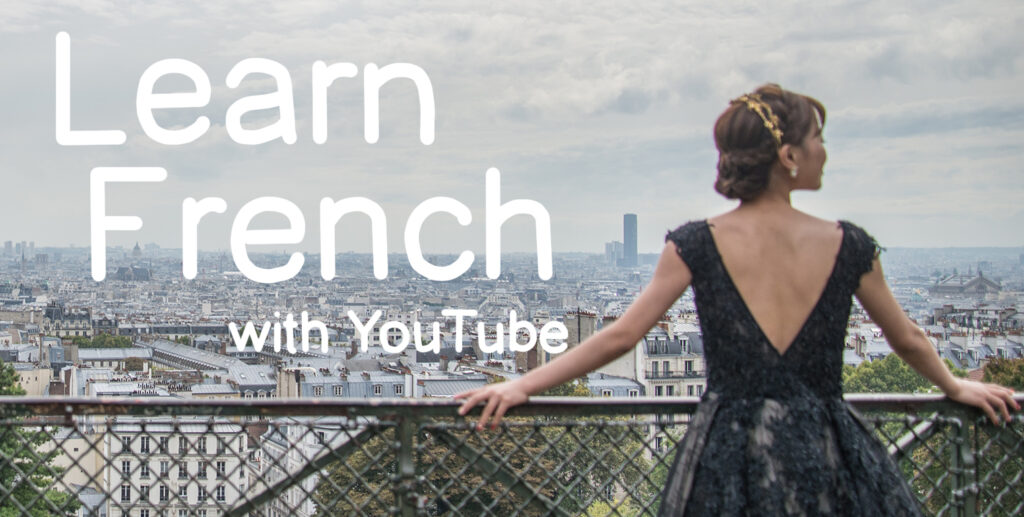

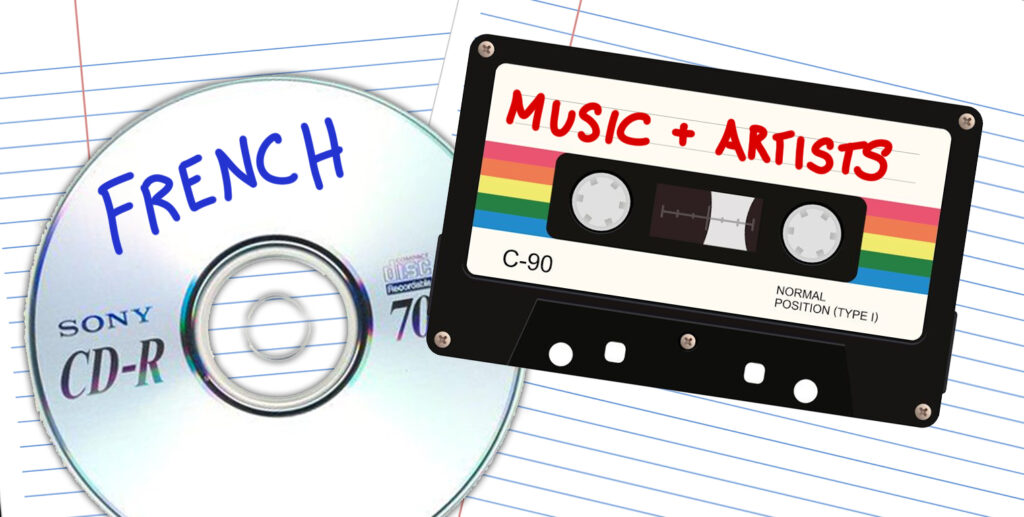

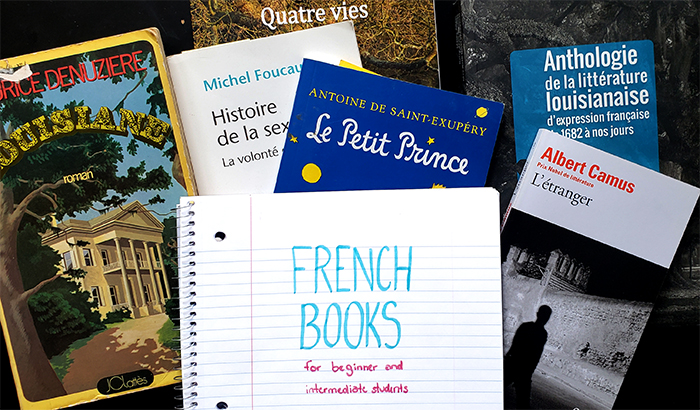
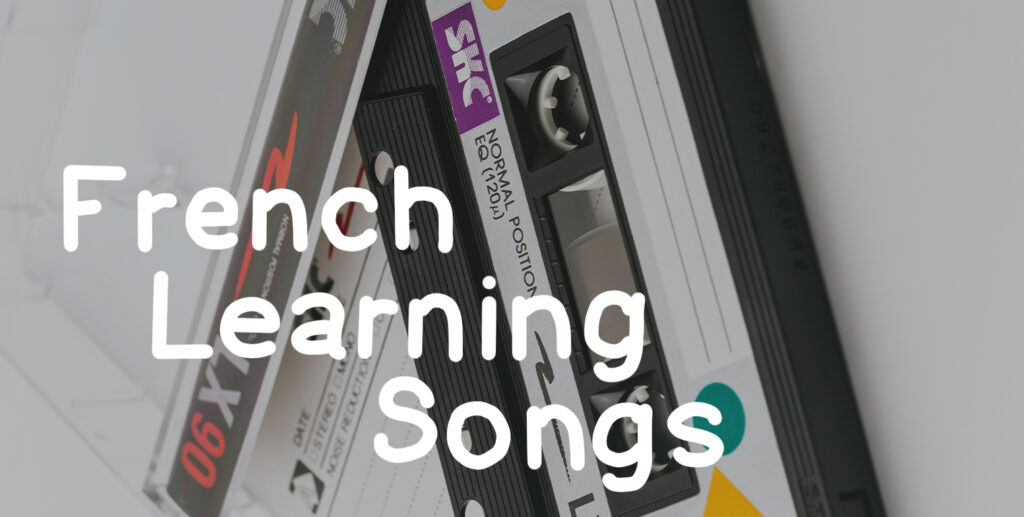
✅ PLAN: What activities do you think you’ll enjoy the most in French? Where and when are you going to find the fun stuff? How are you going to make sure you actually use the fun stuff you find?
🛑 Checkpoint: At this point, you should have a custom plan for how to relearn French. This plan is fluid and will change, but you should have plenty of items on your to-do list.
(If not, go back and review any section with a plan ✅ checkmark.)
Step 5. Maintain Your French After You Relearn It
You’ve already forgotten your French once.
So in 5 or 10 years, how do you stop yourself from forgetting it a second time?
How do you relearn French but this time make it stick?
The central idea is to totally integrate French into your life. So here’s how you can do that in a few steps ways.
5A. Keep your reasons for relearning French close at hand
Remember that daydream we worked on above?
While you’re learning, you need to be consistently moving towards it.
And once you’ve reached that daydream moment?
You want to keep living it.
This means that continuing to do the things you love in French as part of your daily life without extra planning or accommodating.
So what was your daydream? Reconnecting with family members, watching silly reality TV, finding new French music... ?
Here’s how you can keep that daydream fresh for once you’ve reached your goal level of French:
- Take photos of the amazing memories you have in French. When you do anything that makes your heart race with excitement, you need to remember that feeling. Put those photos on your fridge, framed on a bookshelf, or on a cell phone lock screen.
- Keep a journal in French. Don’t just document your day-to-day learning, but your biggest victories. Whenever you feel down, go reread it.
- Make a vision board. If your French goals don’t involve other people, you can enjoy making collages of past-victories and still more future-goals in a scrapbook or behind a frame to look at whenever you feel frustrated.
The goal with any method of keeping your vision close at hand is that it’ll be something you can look at whenever you want.
Now with this said, it’s ultimately by using your French every day that you’ll maintain it.
Let’s see how.
✅ PLAN: What will you do to keep your reasons to relearn French fresh in your mind?
5B. Build a strong language learning habit
Now–there are people who major in a language in university and forget it within a few years.
But then there are polyglots who speak 5+ languages without forgetting any.
What’s the secret?
(And no: it’s not a special talent.)
Here’s how the best language learners in the world keep their language skills strong:
- Change how you get your news information. This could be finding new podcasts in French, streaming Le Monde, listening to business / tech reports, or anything else.
- Learn new skills. Sites like Udemy have whole portals where you can take classes in virtually anything you need…. but in French. (Just switch the language settings.)
- Keep other hobbies alive. If you love to cook, knit, build model trains, read, play an instrument… odds are you can change your learning materials into French or add something fun in the background in French.
- Turn off your brain. Eventually, when your French becomes amazing you’ll find it just as easy to watch Netflix or listen to music in French as in English. Incorporating French into your downtime will help make keeping it effortless.
- Find some time every day when you won’t be interrupted. You can use this as your daily study time for refreshing flashcards, doing exercieses, or learning some new grammar. (Even if it’s only 15 min.)
Here are three daily French flows to inspire you with.
Michel wakes up with a French news podcast every day while he gets ready, then switches to French music during his morning workout. His work and social life are all in English, but before bed he just reviews any new flashcards he has and then falls asleep to French Netflix.
Marie spends her Sundays in French trying new recipes, doing language exchanges, and watching French films. During the week she would rather enjoy the same movies and shows as her husband, but she still reads a bit of a French book every night before bed.
Elizabeth started following more French accounts on Instagram and adds a French caption to every one of her own posts (under her normal English caption for her friends). She follows along with a true crime podcast in French on her commute and does a once a week language exchange with a group of online friends she made.
No matter how you want to organize your life or schedule, folding French in can be fun and effortless. (As long as you plan first.)
✅ PLAN: What is one thing you do for fun every single day? What skills would you need to do in order to start doing that thing in French?
5C. Join the French relearning community
This website is dedicated to bringing together language speakers who have forgotten their language without guilt.
Find resources and connect with other people who want to relearn a language by following our YouTube or personal Instagram.
Here are some other places you can check to find fellow French learners:
- Instagram hashtags like #frenchstudent #learningFrench or #frenchbooks
- Facebook groups for language learning
- Apps that help you find language exchange partners (like Tandem or HelloTalk)
Finding other people like you will not only be inspiring but help you be accountable to your language learning goals.
✅ PLAN: Where can you find other French learners? When do you want to start looking for a language learning community?
Step 6. Learn More About How To Relearn French
✏️ Reflect: What were your biggest takeaways from this tutorial?
What are you going to do first? What will be the hardest, and how are you going to stop yourself from giving up?
Now as I said at the beginning of this article, this entire website exists to help people relearn languages.
(You might have noticed, no?)
And as I sit finishing this article, I think of a million other things I should be telling you about how to relearn French.
Stories from friends who have relearned French in the past, as well as their advice.
The history of colonialization of the Americas, and how that affects our languages.
More tools I love for learning French.
Other ideas for integrating French into your life to never forget it again.
So feel free to explore this website. Follow me on all of the above mentioned social media.
And if there’s anything else you want this website to cover about how to relearn French, leave it in the comments below so I can use it as inspiration for future articles and videos.
